Unveiling the pathway to the portfolio interview for reputable medical degrees of Ignite RIS students
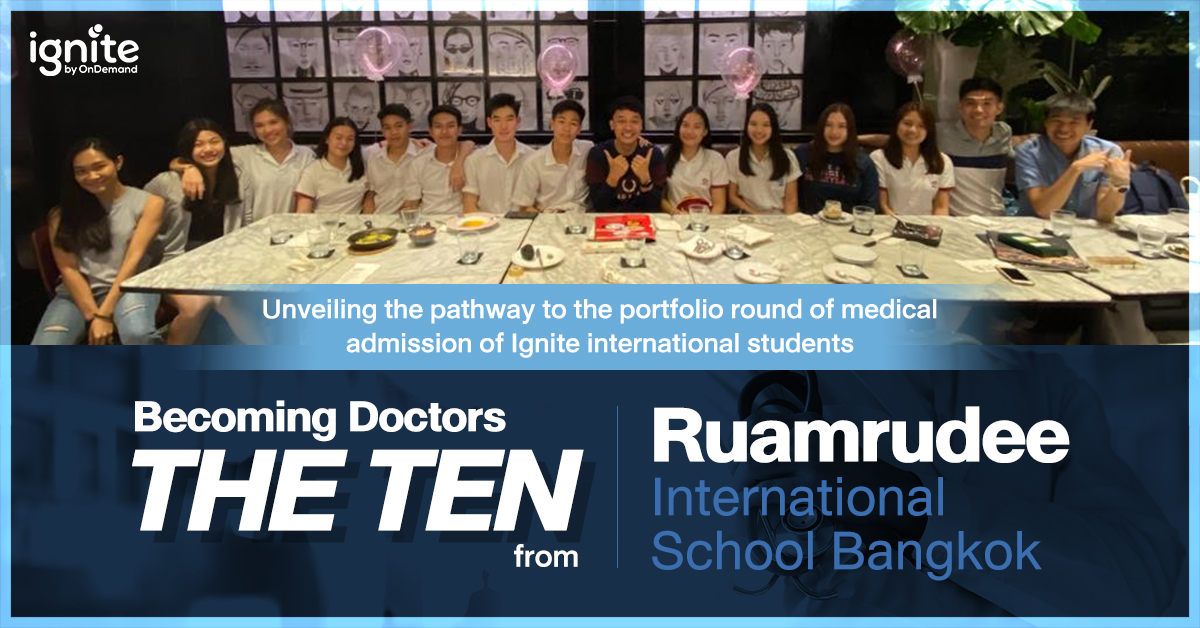
Greeting to all potential medical doctor candidates! Today, we want to share with you the experience of Ruamrudee International School Bangkok (RIS)’s students who made it to the portfolio round of the latest year. From scoring multiple tests, working on your portfolio, and finishing it all with the interview, we have all the information for you to be able to take the steps to be admitted to a medical program confidently since the first round.
It is a common thought that international students have a lower chance of becoming a medical candidate, but this is certainly not the case. The proof is right here with 10 of our students who attended RIS. They made it to the start of their study to become doctors and dentists from top universities such as Chulalongkorn, Ramathibodi, and Mahidol, not to mention the international PCCMS UCL, CICM, and MIDS. We will proudly present this selection of six students to represent RIS and Ignite in this medical starting point.u
Getting to know the Portfolio-proof RIS medical gang!
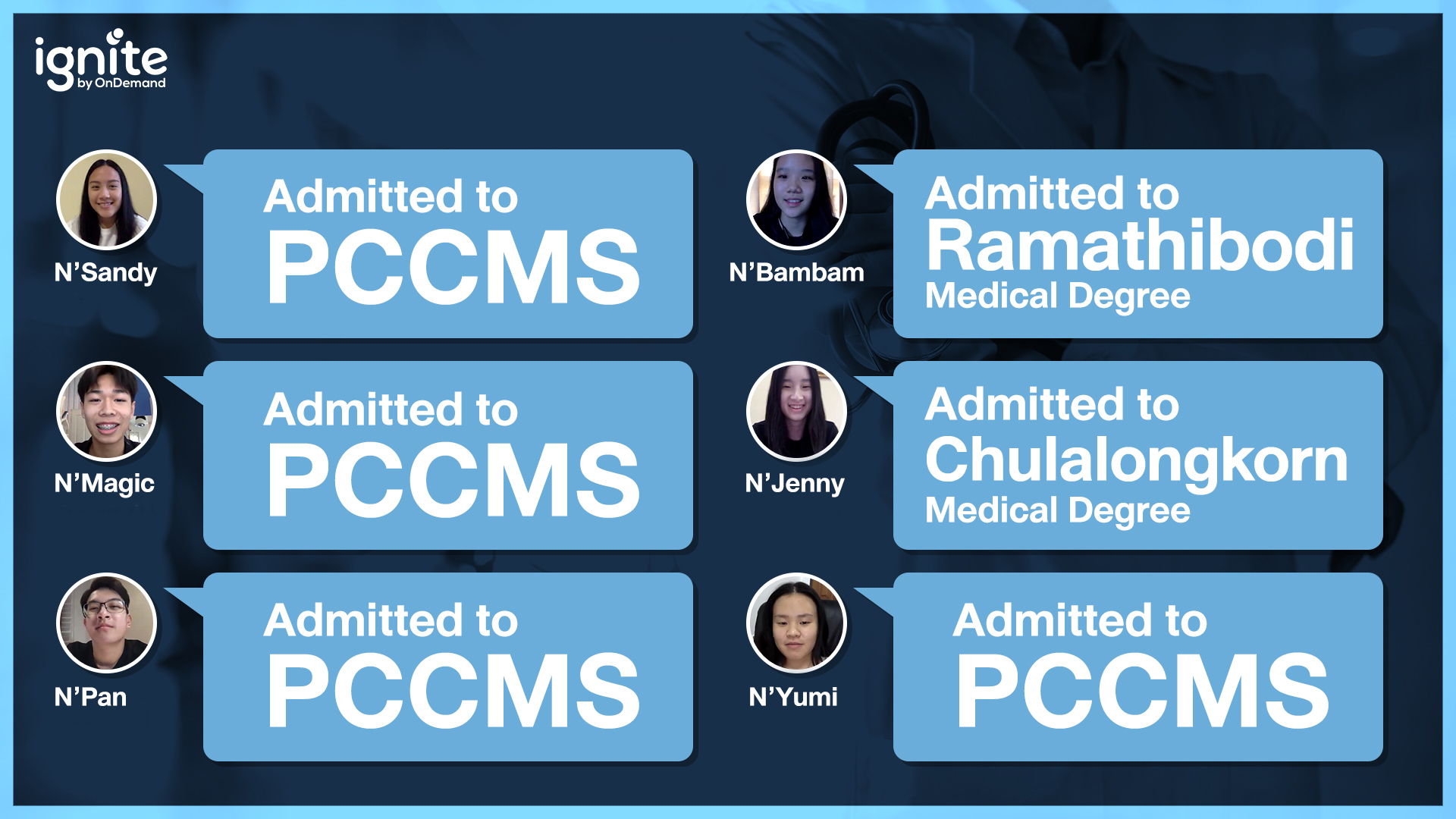
Sandy: Hello, Sandy here. Made it to PCCMS UCL and got the chance to be interviewed for CICM.
Bambam: Made it to Ramathibodi and was interviewed for Chulalongkorn Dentistry, MIDS, and CICM.
Magic: I’m Magic. Made it to PCCMS UCL and was interviewed for CICM and MIDS.
Jenny: Made it all the way to Chulalongkorn, shortlisted for an interview at Ramathibodi, and was interviewed for CICM and Rangsit.
Pan: I’m Pan. Made it to PCCMS UCL and was interviewed for CICM and MIDS as well as ISE.
Yumi: Made it to PCCMS UCL and was interviewed for MIDS and CICM.
So, tell us, what led you to a medical degree?
Jenny: I followed in my mother’s footsteps. Following my mom to the hospital since I was young gave me a clear imagery of what being a doctor is like. Having spent so much time in the hospital and observing how my mom treated people, there is a fondness in me.
Yumi: It was after I moved to RIS. There was a senior who gave a guidance session. It felt compatible then. Actually, my mom wanted me to study dentistry, but I don’t like art-based work, so I opted for a medical doctor option.
Pan: I just recognized that I want to study a medical degree around Grade 11. At first, I was aiming for ISE. However, after a guidance session from a senior, I felt that being a doctor is a better fit for me.
How to pass SAT Subject Tests with high enough scores to be eligible for the portfolio round?
The shared approach among the students is simply to take the subject that one has the highest proficiency in first. For them, this is none other than chemistry. Starting with the most proficient subject for oneself allows each person to reach the required score quicker and have more time to prepare for the rest of the subjects.
The hardest one of them all is unanimously agreed to be biology. It is a subject packed with contents and a difficult one to guess what could be in the exam. To make matters trickier, it is also filled with long questions that are difficult to read thoroughly in time, leaving examinees flustered. It is imperative that test takers keep their focus and practice with past papers.
You can take up to 3 subjects in one attempt at SAT Subject Tests, so what are the techniques of Ignite RIS students?
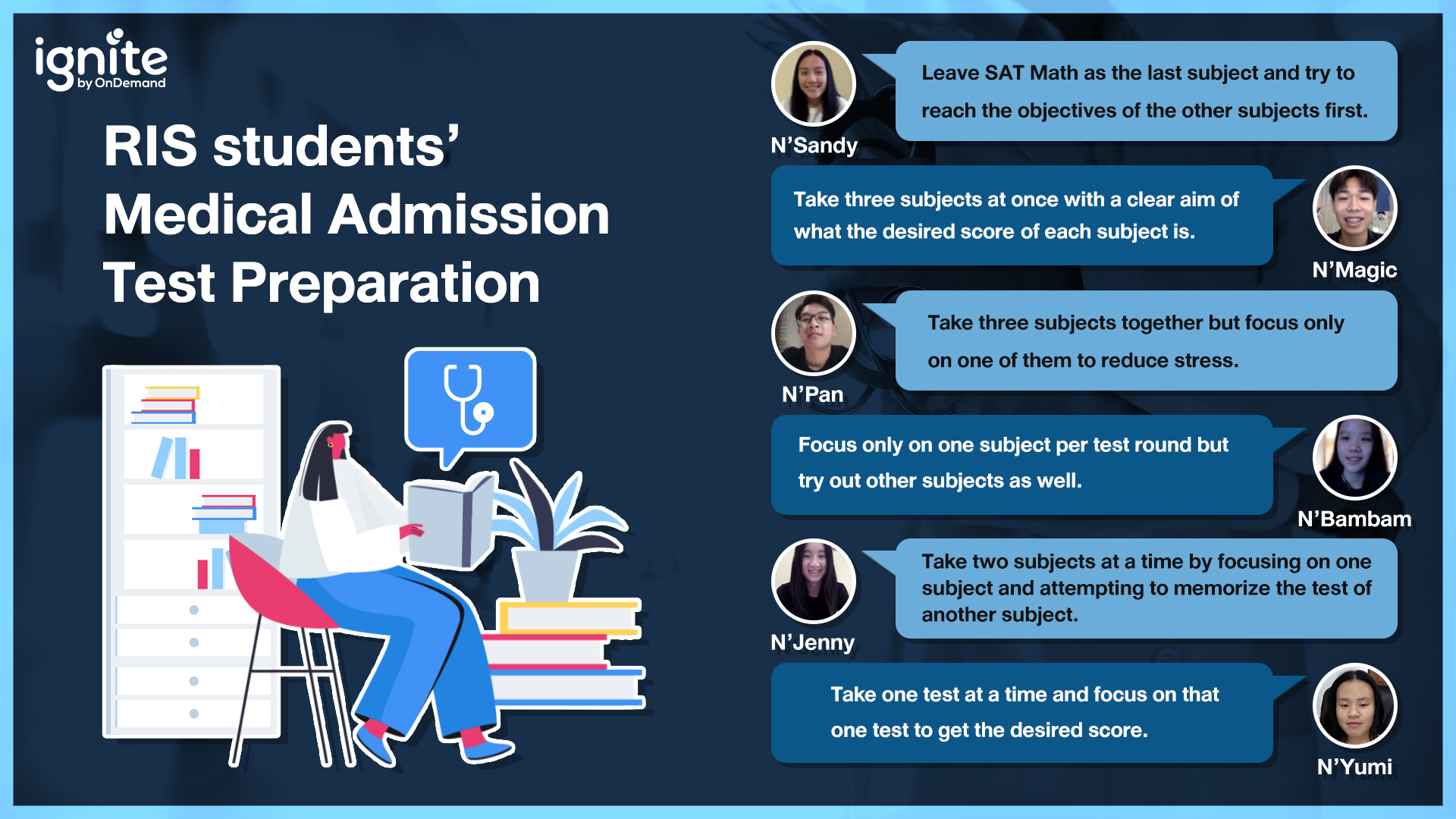
Jenny: I took two tests at a time. One would be the one I would focus on and another would be taken just for the sake of familiarizing myself with how the test was like.
Magic: I took all three in a single attempt with a clear goal in mind of how much I wanted to get for each subject.
Sandy: I started with chemistry and biology. After getting the scores I wanted, I moved on to Math Level 2.
Bambam: In each attempt, I focused only on one subject, but I tried others just for experience sake.
Timeline for the preparation for the portfolio round
Jenny: I started with SAT Subject Tests around grade 11. I first focused on just SAT. After obtaining the scores I wanted, I shifted to focus on IELTS and then BMAT thereafter. When all the scores had been obtained, I prepared for interviewing, finding MMI questions to practice.
Bambam: I also started around grade 11. By the time I was done with SAT Subject Tests, I was already almost in grade 12. Intensive BMAT preparation started the summer before grade 12. After that, it is the gradual preparation of the portfolio, but this was a close call, just two weeks before submitting.
Sandy: I started so much slower than the others. By the time the others had taken tests, I had only started to improve my chemistry. I only got to take a test in December that year. The preparation for the portfolio and SAT Subject Tests was roughly around the same time with increased intensity during the summer. With all that said and done, I did prioritise BMAT, reading extensively and being tutored for 6 hours a day for Section 2.
Magic: I spent quite some time on IELTS. My impression was that it should not be an obstacle since I studied an international program. The test proved to be otherwise with the difficulty of the writing part. After the first try, I had to focus on improving my writing for a higher score.
Tips and Tricks for a guaranteed success with Portfolio
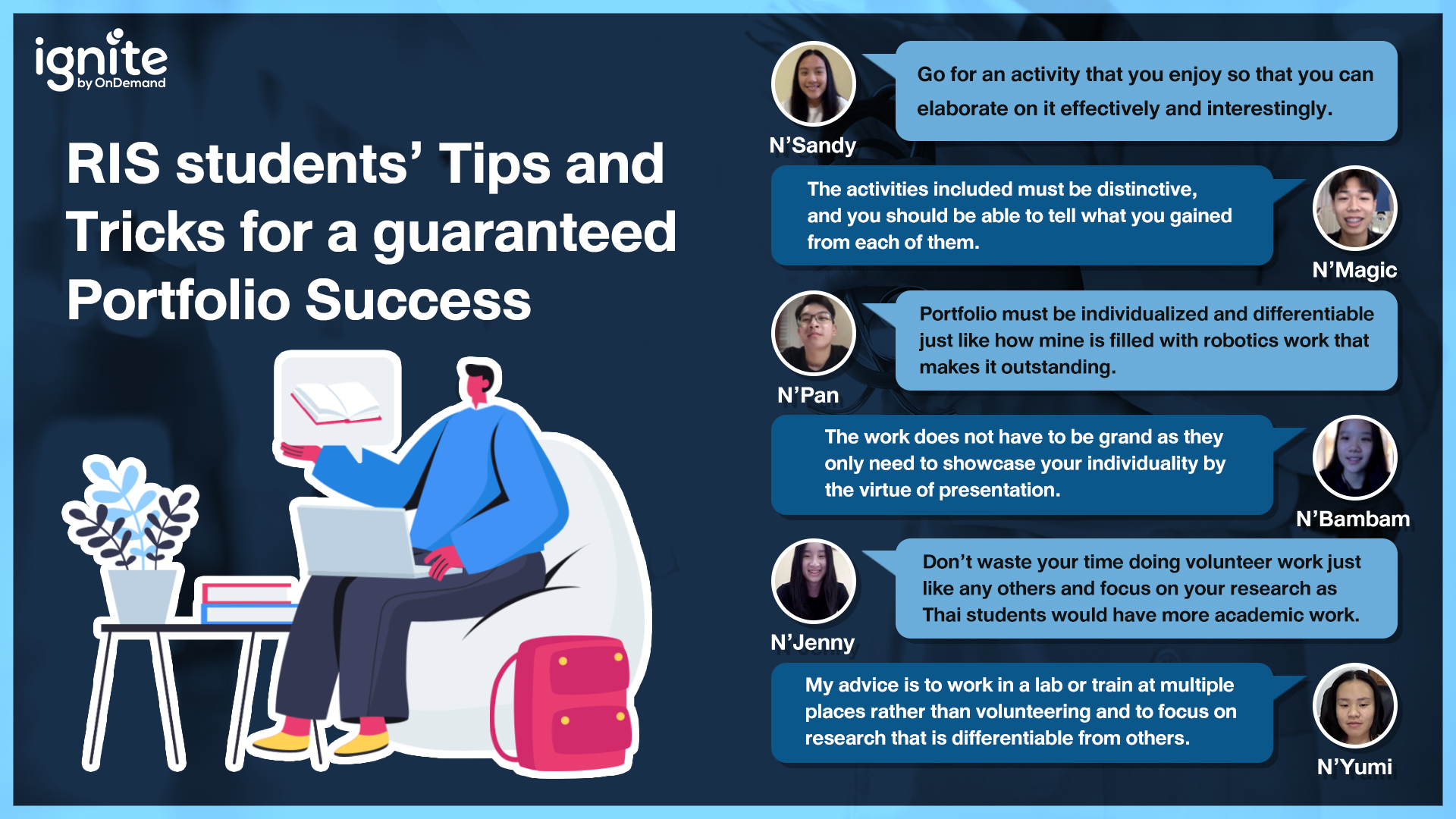
This is how the RIS crew planned their portfolio filled with their outstanding work.
Jenny: I started since Grade 10. Initially, I got to train at a hospital. Being from an international school actually made it easier to get the opportunity to train as we studied IB (and had support from the school) that geared us with full research skills, allowing our portfolio to be different and competitive against Thai school students with academic competition experience and medals.
At first, I felt like I did a lot of volunteer work like cleaning and food distribution already. However, all of this amounted to nothing. It is no different from others, and these activities are not useful for the portfolio. Thus, I think that what actually matters are activities that demonstrate teamwork and/or leadership or, even better, work that showcases your performance without involving others.
Bambam: It was a lucky situation where the school had a lot of volunteer clubs that benefited us with the quality of volunteering with all the activities that allowed us to demonstrate leadership and teamwork, building to a decent portfolio.
Actually, I did not do many activities. I did so little, in fact, that it paled in comparison to others. What I prioritized was my Personal Statement and the approach of telling the story of my performance in an interesting way. The advice is that there is no need for grand activities nor a large quantity of them. What actually matters is presenting your portfolio interestingly and differently.
Magic: I prepared my portfolio in a similar manner to the others. Mine, however, has personal circumstances included in it such as the separation of my parents so as to demonstrate the capability of understanding others in different situations. I also showcased leadership by discussing the sport I’m into. My advice would be that volunteer work is of no impact. The key thing is to differentiate your portfolio from the others. I did not think that I could compete with Thai students academically, so I tried to compensate for that by gaining experience working in a hospital and a lab to enhance my portfolio.
Sandy: I think that we should do what we like outstandingly. As for me, I like helping people, so I worked with Poh Teck Tung Foundation all summer. I got the chance to actually go and help people in need such as with motorcycle accidents and diabetes patients. I would advise going with an acquaintance or a friend in this endeavor.
Pan: My portfolio is drastically different from the others. I have previous work in robotics and had the chance to compete in a competition in Taiwan. My portfolio contains over 10 pieces of robotics-based work with just a single sample of volunteer work. This proves that even a portfolio like mine can lead to admission since the first round.
Yumi: I started producing work for my portfolio since around grades 10-11. Our school emphasizes research skills, so my portfolio was filled with research of quality. Instead of volunteering, I focused on working in hospitals and labs.
How was the real interview for the first round of medical admission (2020) like?
Jenny’s Interview for Chulalongkorn Portfolio Round
For this interview, if you have obtained the required scores, your scores become irrelevant. It is your personality that they will be evaluating. You have to hang on despite the pressure.
There are 3 groups on the interview day. This works on a first come, first served basis. I would suggest going early to reduce anxiety. You have to go through 5 interview rooms, each taking 12 minutes. You are given 2 minutes to read the questions (with paper and pencil provided).
The examiner in the first room asked about a situation where a doctor sells coffee via Facebook, using doctor status as a guarantee that the coffee is safe for people with diabetes. You have to analyze an English piece of research in Thai in the second room. The third room involves a teamwork-oriented role-playing. In the fourth room, you have to make a decision on who to execute Thai questions and answers. The fifth room is where the interview is conducted in English. It involves self-introduction and discussion of what you like and why do you want to study a medical degree. There was also a psychological test conducted in Thai on the same day, so you have to brace yourself for writing in Thai.
Another thing for international students is to not ignore the importance of the physical check-up day. It is a good opportunity to check out your classmates. They will mostly be from Thai schools, so you might have to adapt a little bit.
Bambam’s Interview for Ramathibodi Portfolio Round
There will be a 77-item psychological test with only 30 minutes to complete it, so spontaneity is key. On top of that, there is also a 45-minute essay asking you to discuss your goal and explain your drawing (which was of trees and women in my case).
You can wear a relatively casual cloth on the day. You will be identified by number instead of name. Mentioning your name or school is prohibited. There are 27 rooms (including the resting room) in total. The length of the engagement is an obstacle as you would have to spend about half a day there. You will be burnt out by the later rooms. It is important to keep in mind that you have to know your portfolio inside out as you will not be allowed to take it with you.
The first room is all about the lowest point in your life. You have to describe it and explain how you dealt with it and recovered from it. You might be pressured with remarks such as one asking whether the lowest point you have just described is already bad enough to be called a low point. The second room involves expressing your feeling in regard to the roles of givers and takers from an image as well as describing your experience with these roles. The third room is where there is a simulated situation. In my case, I was leading someone who has never been to Japan on a trip there. The examiner will provide one problem after another for you to solve such as the situation where people do not follow your plan or oppose you. In the fourth room, I was asked about my opinion in regard to the statement that a person becomes a doctor to help people. There is also a situation where I was an admin for a health website with a large number of followers. If I, as the admin, posted a piece of inaccurate information, how would I deal with the situation? In the fifth room, the test was a role-playing situation where I and my friend took an Olympic test. My friend had already taken the test thrice but still had not passed. I, on the other hand, had a resounding success on my first try. The senior medical students will be
role-playing with you.
I had to discuss how I managed through a failure in my life in the sixth room. For the seventh room, the examiner asked about the benefits of the hard work put into preparing for a medical degree as well as what can be improved afterward. The eighth room is where the answers you have given on the previous day will come back into play. What you have answered them previously will have to be expanded upon. There is also that question of the person you will select between your parents. The ninth room is the portfolio room. You have to explain your work in the portfolio down to the minute details of the number of words in Thai in your portfolio. Everything is very detailed. The tenth room is another situation where you friend woke up late to an exam and had to take the class again in the summer as a result. This friend of yours had already planned for a trip abroad with family members. This friend asked you who have a doctor as a father to write a fake doctor certificate. The friend would do this regardless of whether you helped or not. You will be asked what you will do in this situation and whether you have let a friend copy your exam answers before.
Yumi’s Interview for PCCMS UCL Portfolio Round
Well, for PCCMS UCL’s interview, there are 9 rooms including 2 resting rooms. The questions are asked in English and Thai, but it is possible to ask the examiners in some rooms to answer in English.
There are not that many rooms for the interview, and each room does not involve too pressured a situation as they focus on analyzing data to form a project as well as research skills that are the strength of the university.
The first room is low on pressure. It just involves questions regarding germ transmission in a hospital such as preventive measures and knowledge of hand washing procedure. The second room has a psychologist as the examiner. You will be asked personal questions (such as your motivation for becoming a doctor) and questions that are built on your answers to the previous questions. The third room is nothing but pressure. The dean of the university will be examining you in Thai and English interchangeably. You have to answer these with fluency. The focus is on checking whether you have done your portfolio by yourself, so the questions revolve around the amount of time you took to complete your portfolio and an interesting piece of work in your portfolio. There are personal questions like those about your family and general questions like the reason why you want to study there or whether studying here is your first choice or not. Volunteering comes into play in the fourth room. You will have 2 minutes to read questions in Thai that involve a volunteer project for helping and developing Lak Si community (the location where the university is situated). It is better to discuss a practical research project than a grand one when you are interviewed in the fifth room. This is where you can demonstrate your research skills to the examiner (rather than trying to please them). In the sixth room, you have to discuss how you are going to deal with a cancer patient who refuses to take surgery and wants to be treated with herbs instead. Another level of this is if the patient is your mother. A professor from UCL (the partner university) will be waiting for you in the seventh room. The professor will ask about problematic issues in the hospital such as dealing with a patient who is angry at a hospital staff member.
Comparing the experience of Mock Interview at Ignite with the real deal
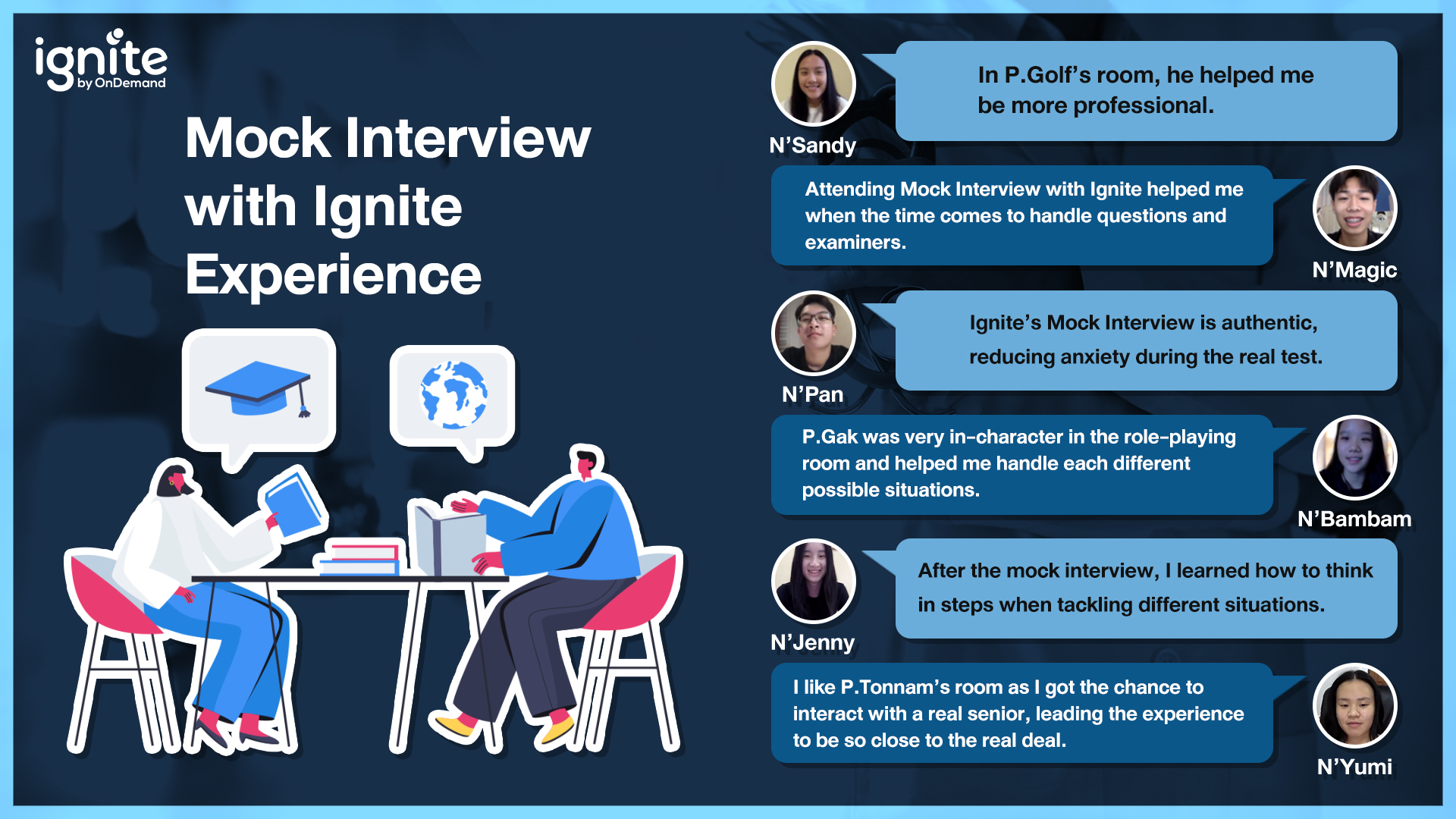
Sandy: I got the chance to meet P.Golf in the mock room. My weakness and strength were identified for me. I also got the advice to introduce myself more professionally.
Magic: Having the mock interview at Ignite helped me to know how to handle the questions and the pressure from the examiners with professionalism. Have to thank Ignite for this.
Pan: Ignite’s Mock Interview is wonderful. It helped reduce my nervousness on the real day by far. I was not agitated and had the concentration to communicate with the examiners effectively.
Bambam: Mock Interview at Ignite has a role-playing room. P.Gak played as an examiner with a level of authenticity. So, in the real interview, I was not nervous. P.Gak also gave me the advice on how to handle different role-playing situations.
Jenny: Mock Interview at Ignite feels very authentic. It helped easing the nervousness of the real day. Suggestion and procedural thinking steps were advised with consideration to the real interview situation.
Yumi: P.Tonnam, a senior at PCCMS UCL, was there for Ignite mock interview, so my experience was very close to the real deal.
Impression from studying with Ignite by OnDemand
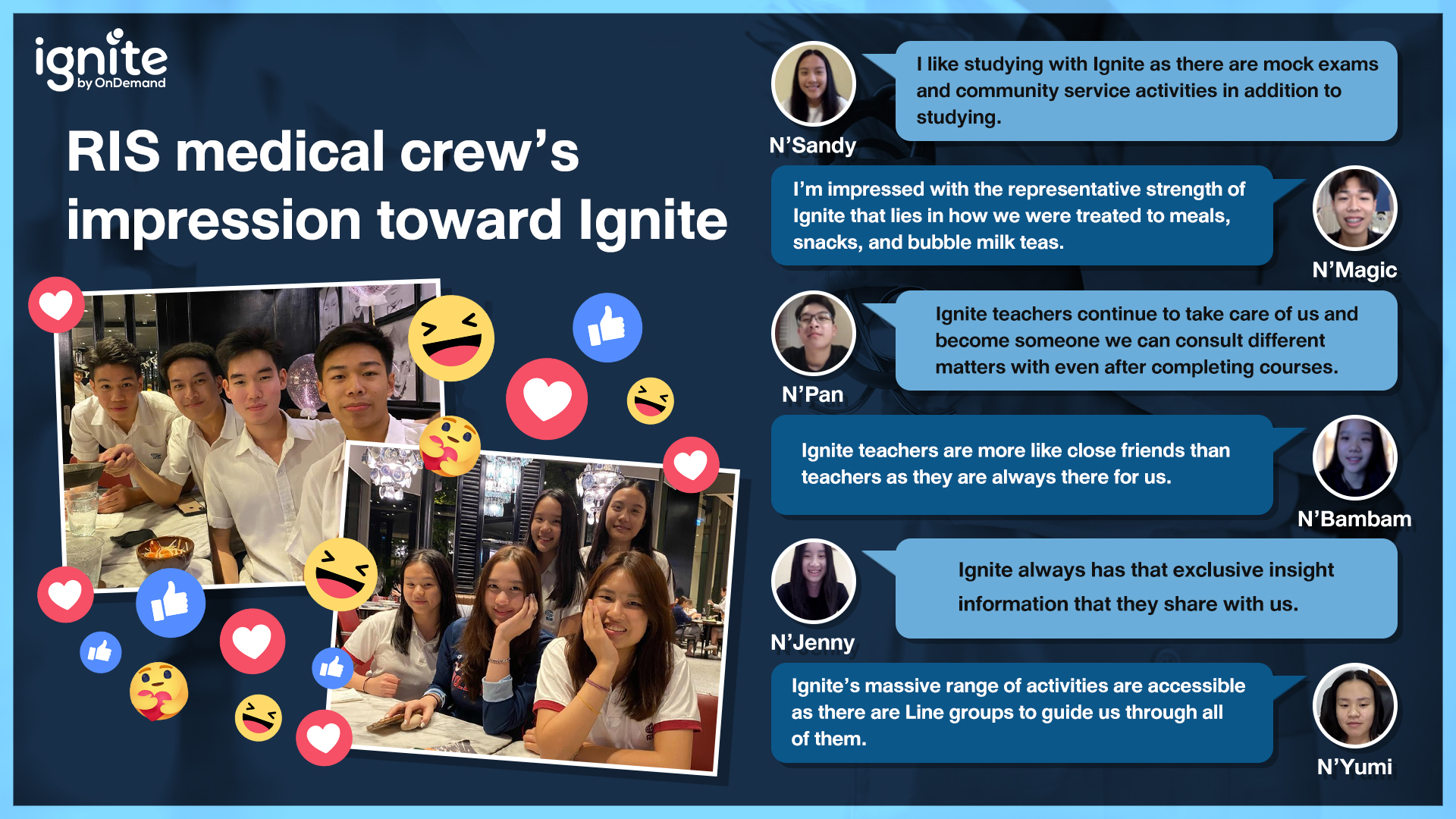
Sandy: I like that Ignite not only has teaching but also useful activities such as mock exams or community service events.
Magic: Ignite likes to treat us to meals, snacks, and bubble milk teas. This is what I would consider as Ignite’s representative point.
Pan: I am impressed with Ignite teachers. Every one of them takes care of us from studying matter to personal and general stuff.
Bambam: Ignite teachers are not only good at their job but also friendly and supportive. For me, Ignite teachers feel like close friends more so than teachers.
Jenny: What I’m impressed with Ignite is that, aside from teaching and materials of high quality, Ignite tends to have a great amount of insight information especially for portfolio round that cannot be found anywhere else.
Yumi: Ignite has a lot of accessible events. You are informed of these without effort via Line groups that tell you what happens when as well as staff members that advise you on which one you should attend.
We have provided a detailed information for the preparation for the portfolio round of medical admission from RIS crew. We have shared the decision-making process on how to take the tests, difficulty of subjects, test-taking timeline, portfolio planning, and real interview experience. This is a worthy article to read through.
For those who want to be admitted since the first round of medical admission and join these beneficial events from Ignite just like the RIS crew before you, you can also consult with us in regard to the details of studying in a medical department (Portfolio Round 1) as well as all any desirable international degrees via Line @igniteastar , or through these numbers: 02-6580023 & 091-5761475.
You can check out our courses’ details here at https://www.igniteastar.com/
You can register for courses online by yourself through ShopOnline of Ignite here at https://shop.ignitebyondemand.com We welcome all!
Related Blog & News
ข่าวสารและกิจกรรมที่เกี่ยวข้อง
-
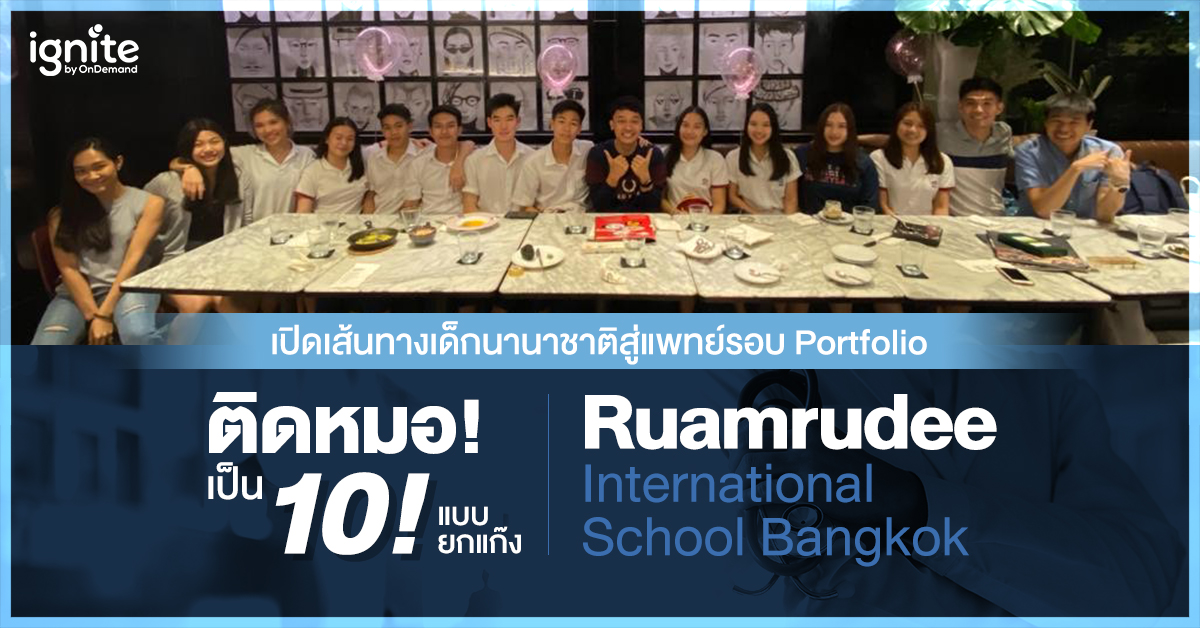 Blog, Medical TCAS 1 (Portfolio), SAT Subject Tests
Blog, Medical TCAS 1 (Portfolio), SAT Subject Tests
เปิดเส้นทางเด็กนานาชาติสู่แพทย์รอบ Portfolio ติดหมอเป็น 10 คนแบบยกแก๊ง! Ruamrudee International School Bangkok
สวัสดีน้องๆ ว่าที่หมอทุกคนนะครับ !! วันนี้พี่แอดมินพาน้องๆ จาก โรงเรียนนานาชาติร่วมฤดี หรือ Ruamrudee International School Bangkok (RIS) ที่สอบติด แพทย์ รอบ Portfolio ปีล่าสุด มาพูดคุยและเล่าเรื่องราวการเตรียมตัวตั้งแต่การสอบเก็บคะแนน การทำพอร์ตไปจนถึงการสัมภาษณ์ เพื่อให้น้องๆ ว่าที่หมอได้ข้อมูลอย่างถูกต้อง และสามารถเตรียมตัวสอบเข้า แพทย์ รอบ 1 อย่างมั่นใจกันนะครับ หลายคนชอบคิดว่าเด็กนานาชาติโอกาสสอบติดหมอน้อยกว่าเด็กภาคไทย ขอบอกเลยว่า ไม่จริงเพราะน้องๆ RIS ที่เรียนกับ ignite สอบติดแพทย์และทันตะรอบ Portfolio กว่า 10 คน ไม่ว่าจะสอบติดแพทย์จุฬาฯ, แพทย์รามา, แพทย์จุฬาภรณ์ (PCCMS UCL), แพทย์อินเตอร์ มธ. (CICM) หรือทันตะอินเตอร์มหิดล (MIDS), ทันตะจุฬาฯ และอื่นๆ […]
Comments (0)
-
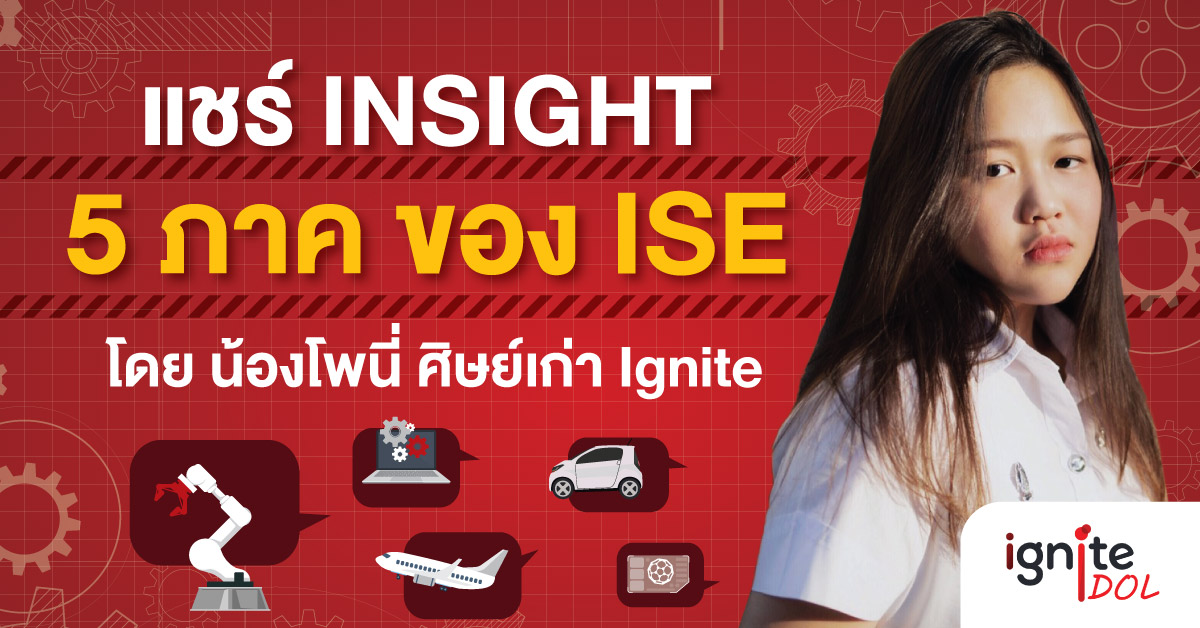 Blog, SAT Subject Tests
Blog, SAT Subject Tests
เจาะลึก 5 ภาคของ ISE คณะวิศวะอินเตอร์ จุฬาฯ กับน้องโพนี่ รุ่นพี่ ignite
สำหรับว่าที่ วิศวะอินเตอร์หลายๆคน ที่อยากเรียน ISE (INTERNATIONAL SCHOOL OF ENGINEERING) หรือ คณะวิศวกรรมศาสตร์ จุฬาลงกรณ์มหาวิทยาลัย หลักสูตรนานาชาติ เคยรู้มาก่อนมั้ยว่า 5 ภาค ในคณะที่เราสนใจ ต้องเรียนอะไรบ้าง แล้วแต่ละภาคมีความน่าสนใจยังไง!? วันนี้พี่แอดมินมีรุ่นพี่ ignite ที่ตอนนี้เป็นนิสิตปีหนึ่ง จากคณะ ISE จะมาเล่า Insight ภายในคณะให้น้องฟังกันครับ ถ้าพร้อมแล้ว เราไปดูกันเลย สวัสดีน้องๆ และทุกคนที่กดเข้ามาอ่านนะคะ ก่อนอื่นเลยพี่ขอแนะนำตัวก่อน พี่ชื่อ โพนี่ จบจากโรงเรียนนานาชาติเอกมัย (EIS) ตอนนี้เรียนอยู่ ISE ปีหนึ่ง ภาค ICE ค่ะ บทความนี้พี่ตั้งใจมาแชร์ Insight ของแต่ละ Major ใน ISE […]
Comments (0)
-
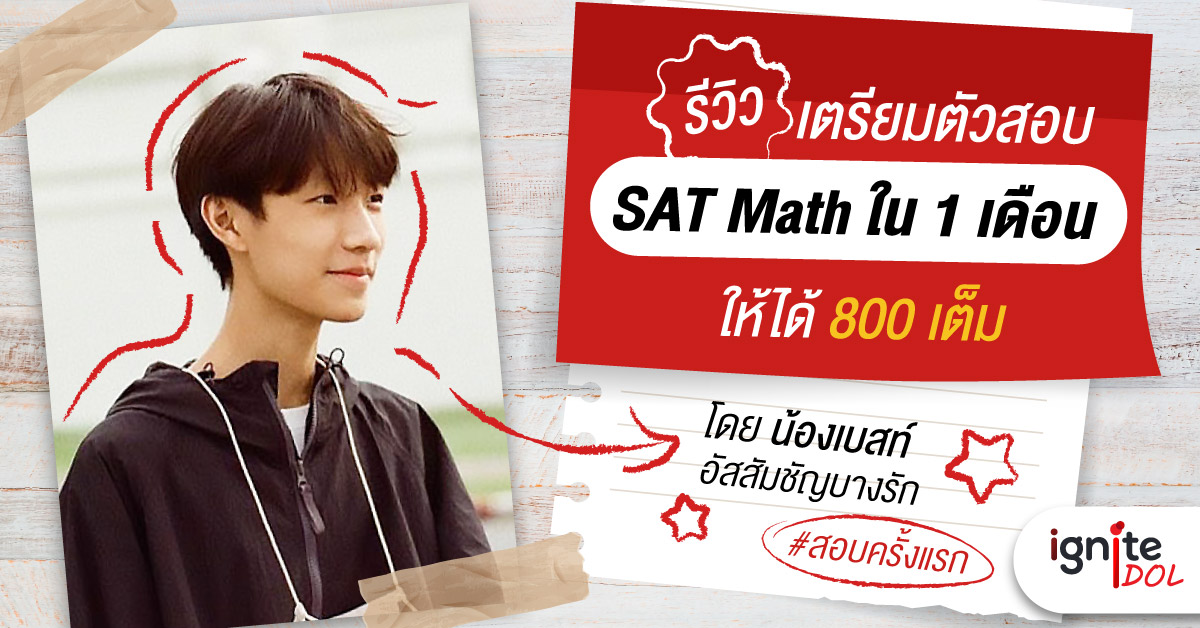 SAT Math, Blog, SAT
SAT Math, Blog, SAT
รีวิวเตรียมตัวสอบ SAT Math ในเวลา 1 เดือน ให้ได้ 800 เต็ม ตั้งแต่สอบครั้งแรกโดยน้องเบสท์ อัสสัมชัญบางรัก
สวัสดีครับ ใครกำลังเร่งเตรียมตัวสอบ SAT วันนี้พี่แอดมินพา น้องเบสท์ ignite idol ที่สอบ SAT Math ครั้งแรกก็ได้ 800 เต็ม อีกทั้งยังใช้เวลาเตรียมตัวแค่ 1 เดือนเท่านั้น…ใครอยากรู้ว่าน้องเบสท์ มีเคล็ดลับเทคนิคและวางแผนการเตรียมตัว SAT Math อย่างไร…ห้ามพลาดบทความนี้นะครับ ก่อนอื่นต้องบอกเลยว่าผมไม่เคยรู้อะไรเกี่ยวกับการสอบ SAT Math มาก่อนเลย…ไม่รู้ว่าคือข้อสอบแบบไหน เนื้อหาเป็นอย่างไร รู้อย่างเดียวคือเอาไว้ใช้ยื่นคณะอินเตอร์ ซึ่งผมอยากเรียน BBA TU ครับ ตอนเพิ่งขึ้น ม.5 ก็ยังไม่ได้หาข้อมูลอะไร คิดว่าอีกนานกว่าจะยื่น แต่รู้ตัวอีกที เพื่อนก็พากันไปสอบ SAT กันหลายครั้งแล้ว ผมเลยต้องรีบเตรียมตัวบ้าง วันนั้นถามเพื่อนว่าเรียน SAT Math ที่ไหน ทุกคนก็บอกว่า เรียน SAT Math ที่ ignite…วันรุ่งขึ้นผมก็มาสมัครเรียนทันทีเลยครับ Timeline เตรียมตัวสอบ SAT Math ในเวลา 1 เดือน […]
Comments (0)
-
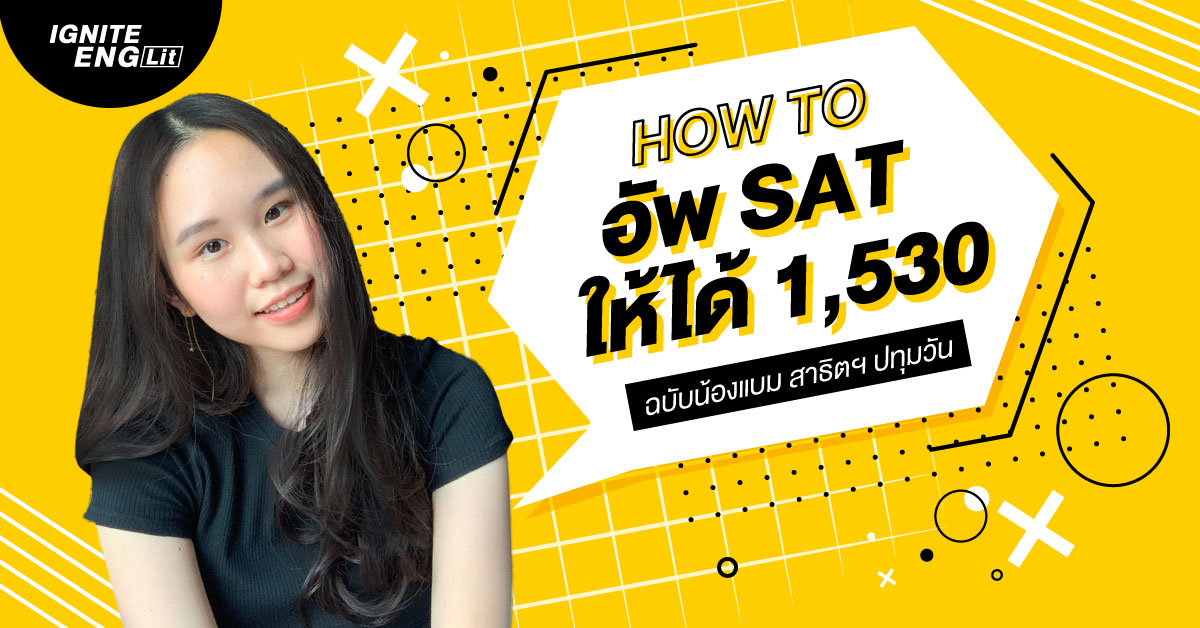 Blog, SAT
Blog, SAT
How to เคล็ดลับอัพคะแนน SAT 1,530 by น้อง Bam ignite
สวัสดีครับ พี่ ignite เห็นน้องๆ หลายคนอาจจะกำลังขมักเขม้นในการเตรียมสอบ SAT กันอยู่ วันนี้พี่เลยพาพี่แบม เจ้าของคะแนน SAT รวม 1530 มาให้น้องๆ รู้จักกัน พี่แบมจะมีเทคนิคในการเตรียมตัวสอบ พร้อมทริค เคล็ดลับอัพคะแนน SAT ยังไงในการพิชิต Perfect Score บ้างนั้น ไปสอบถามกันเลย Q: แนะนำตัวให้น้องๆ รู้จักกันหน่อยครับ? A: สวัสดีค่ะ ชื่อวริศรา ณรงค์วณิชย์ ชื่อเล่นแบมนะคะ มาจาก รร.สาธิตมหาวิทยาลัยศรีนครินทรวิโรฒ ปทุมวัน EP ค่ะ ตอนนี้พึ่งสอบติดคณะแพทยศาสตร์ มหาวิทยาลัยมหิดล ค่ะ Q: น้องมีการวางแผนการเตรียมตัวสอบ SAT ยังไงบ้างครับ? A: พี่สาวของเพื่อนแนะนำให้เตรียม SAT ไว้ตั้งแต่เนิ่นๆ เพราะมันยากกว่าภาษาอังกฤษปกติ ตอนแรกหนูก็ไม่คิดว่ามันจะยากขนาดนั้น แต่พอมาลองทำก็ยากจริงๆ ตอนนั้นจบ ม.4 หนูก็รู้ตัวแล้วว่าถ้าอยากได้คะแนน SAT เยอะๆ […]
Comments (0)


Comments